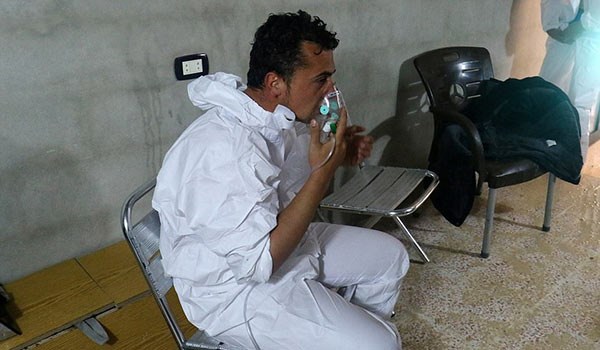EXC: How can Terrorists be aware of Chemical Attack on Idlib, prepare equipment, start media campaign beforehand?


Social media activist in tweeter and facebook released the image of one of the messages of Faras Karam, a journalist of Orient network affiliated to the terrorist groups, about a chemical raid on Khan Sheikhoun several hours before the attack.
“Faras Karam wrote in his message, published at 3:06 on Monday morning hours before the chemical attack, that “a media campaign will kick off tomorrow to cover chlorine gas airstrike on civilians in Hama countryside”.
Media activists are now asking how Faras could find out about the attack and its type several hours before the incident, questioning how he also could specifically determine the chemical element to be used in the attack (chlorine gas).
On Tuesday, media and news sources affiliated to opposition released news about chemical attack in Khan Sheikhoun, accusing Syrian government of carrying out the attack via its Sukhoi 22 fighter jets that left tens of people dead or wounded.
Meantime, a senior Syrian military source underlined that the Al-Nusra Front (also known as Fatah al-Sham Front or the Levant Liberation Board) is the only side in Syria which has access to chemical weapons, raising speculations about certain western spy agencies’ role in chemical attack against Idlib.
“The Syrian army has not used any chemical gases against the citizens in Idlib and it is not logical for the army to kill the residents of a city that it is trying to set free,” the military source told the Arabic website of Sputnik news agency on Wednesday.
He underlined that the Syrian army has had no chemical weapons since 2012 when the terrorist groups stole and transferred its chemical weapons to their caches.
Stressing that al-Nusra Front is the only side which possesses chemical weapons, including toxic gases, the source raised the possibility that certain western spy agencies have also played a role in the chemical attack which killed dozens of people in Idlib province.
The General Command of the Syrian Army and Armed Forces categorically denied allegations and claims circulated by media outlets about the use of chemical substances in the town of Khan Shaikhoun in Idlib countryside.
“The armed terrorist groups used to accuse the Syrian Arab Army of using toxic gases against them or against civilians at anytime they fail to implement the targets of their sponsors and operators or when they are unable to achieve any advantages on the ground in an desperate attempt to justify their failure and to maintain the support of their masters,” the Army’s general command said in a statement.
It categorically denied any use of chemical or poisonous materials in the town of Khan Shaikhoun in Idlib countryside, affirming that it didn’t and will never use those materials in any place or time, nor in the future.
The army’s general command held the terrorist groups and those behind them responsible for the use of chemical and toxic substances and the disregard for the lives of innocent citizens to achieve their goals.
Separately, a Syrian member of parliament, Sharif Shahada, said on Tuesday he believed a chemical arms depot set up and held by the militants in the area might have exploded in the incident, adding that the Syrian government was not in possession of such weapons.
Shahada also accused Turkey of having supplied militants in Syria with chemical arms.
Meanwhile, the Russian military said in a statement that Moscow did not conduct any airstrikes in Idlib province.
The United States and its allies have in the past accused the Syrian military of conducting chemical attacks, while Damascus turned its entire chemical arsenal over to international monitors under a deal negotiated by Russia and the United States back in 2013.
Foreign-backed militants have repeatedly used chemical weapons against Syrian troops and civilians, but the attacks have often been ignored by Western governments.
Syrian forces had also found Saudi and Turkish chemicals in Aleppo that were used by Takfiri terrorist groups to make chemical weapons. Damascus forces also discovered several chemical-weapons workshops in the war-torn country in the past years.
Russia’s Defense Ministry also found poisonous chlorine and white phosphorus in nine samples from Southwestern Aleppo in November 2016.
Russian Defense Ministry’s Spokesman Igor Konashenkov said the UN-backed Organization for the Prohibition of Chemical Weapons (OPCW) was reluctant to join forces with Russia or send experts to Aleppo, adding that “which does not stop some OPCW members from apportioning blame from afar and ignoring the evidence that chemical weapons are being used against civilians.”
Russia’s Foreign Minister Sergey Lavrov said in the same month that the Organization for the Prohibition of Chemical Weapons refuses to send its experts to Aleppo to check substances used by militants in attacks and the move was “seemingly done under pressure from our Western colleagues”.
“Russian specialists found that militants in Eastern Aleppo used ammunition with poisonous substances, with the ammo targeting Western Aleppo. The collected samples leave no doubt that it’s a toxic agent,” he added.
In December 2016, Syrian authorities had provided the Organization for the Prohibition of Chemical Weapons (OPCW) with evidence of mustard gas use by militants in Aleppo province.
Syria has been hit with rounds of Western sanctions for years on accusations that its government exercised violence against its own people. The European Union has extended until June 2017 curbs on Syria linked to investment, oil production and trade.







